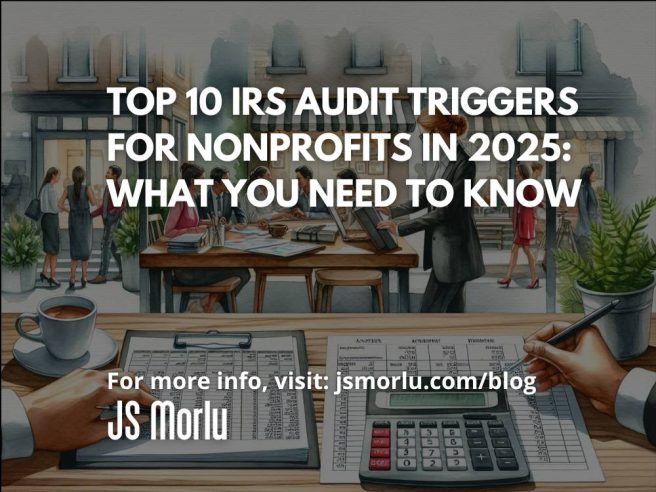By: John S. Morlu II, CPA
In 2025, the Internal Revenue Service (IRS) is amplifying its oversight of tax-exempt organizations. With enhanced funding from the Inflation Reduction Act and advanced data analytics, the IRS is focusing on areas of potential noncompliance within the nonprofit sector. Understanding these focal points is crucial for nonprofit leaders to ensure compliance and maintain their tax-exempt status.
1. Incomplete or Inconsistent Form 990 Reporting
The IRS utilizes sophisticated algorithms to detect anomalies in Form 990 submissions. Discrepancies such as missing schedules, inconsistent data, or unexplained financial variances can trigger audits. In 2024, over 3,000 nonprofits were audited due to issues identified in their Form 990 filings.
🔗 Understanding IRS Form 990: 2025 Compliance Guide
Action Step: Conduct thorough reviews of Form 990 before submission to ensure accuracy and completeness.
2. Excessive Executive Compensation
Nonprofits reporting unusually high salaries for executives without proper justification are under increased scrutiny. The IRS examines whether compensation aligns with industry standards and has appropriate board approval. Failure to comply can result in penalties under Section 4960.
🔗 PwC: IRS Exempt Organization Priorities
Action Step: Benchmark executive salaries against similar organizations and document board approval processes.
3. Private Benefit and Inurement
Transactions that provide undue benefits to insiders, such as board members or significant donors, violate IRS regulations. Instances of private inurement can lead to revocation of tax-exempt status.
🔗 TNPA: How the IRS Can Revoke Exempt Status
Action Step: Establish and enforce conflict-of-interest policies to prevent improper financial arrangements.
4. Unrelated Business Income (UBI) Misreporting
Income from activities unrelated to a nonprofit’s primary mission must be reported accurately. Misclassification or failure to report UBI can result in penalties and jeopardize tax-exempt status.
🔗 GreenGrowth CPAs: Nonprofit IRS Audit 2025
Action Step: Regularly assess revenue streams to identify and report UBI appropriately, filing Form 990-T when necessary.
5. Prohibited Political Campaign Activity
501(c)(3) organizations are strictly prohibited from participating in political campaigns. Even minimal involvement can lead to audits or loss of tax-exempt status.
🔗 GreenGrowth CPAs: Political Campaign Compliance
Action Step: Educate staff and board members on restrictions related to political activities and implement oversight mechanisms.
6. Failure to File Required Returns
Nonprofits that fail to file Form 990 for three consecutive years automatically lose their tax-exempt status. In 2024, the IRS revoked the status of 1,200 organizations for this reason.
🔗 Silent G Consulting: 501(c)(3) Rule Changes 2025
Action Step: Implement a compliance calendar to track and meet all filing deadlines.
7. Employment Tax Noncompliance
Misclassification of workers and failure to pay employment taxes are common issues. The IRS is focusing on organizations that have discrepancies between reported wages and tax filings.
🔗 IRS Compliance Program & Priorities
Action Step: Review worker classifications and ensure all employment taxes are accurately calculated and paid.
8. Noncompliance with Section 501(r) Requirements
Tax-exempt hospitals must comply with Section 501(r), which includes conducting community health needs assessments and establishing financial assistance policies. The IRS is auditing hospitals to ensure adherence to these requirements.
🔗 PwC: IRS Hospital Audit Priorities
Action Step: Regularly review and update policies to ensure compliance with Section 501(r) mandates.
9. Improper Use of Donor-Advised Funds (DAFs)
The IRS is scrutinizing the use of DAFs to ensure they are not being used to circumvent public support tests or for improper benefit to donors. Transparency in grant distributions and adherence to regulations are essential.
🔗 Silent G Consulting: 501(c)(3) Rule Changes 2025
Action Step: Maintain detailed records of DAF contributions and distributions, ensuring compliance with IRS guidelines.
10. Inadequate Governance Practices
Strong governance is critical for compliance. The IRS assesses whether organizations have appropriate policies and active board oversight. Lack of governance can lead to increased scrutiny and potential penalties.
🔗 GreenGrowth CPAs: Governance Compliance Best Practices
Action Step: Develop and enforce governance policies, including regular board meetings and documented decision-making processes.
Final Thoughts
The IRS’s enhanced focus on nonprofit compliance in 2025 underscores the importance of diligent oversight and adherence to regulations. Nonprofit leaders must proactively address these areas to safeguard their organizations’ tax-exempt status and maintain public trust.
For personalized assistance in navigating these compliance challenges, consider consulting with a CPA firm experienced in nonprofit regulations.
Author: John S. Morlu II, CPA is the CEO & Chief Strategist of JS Morlu, a globally acclaimed public accounting and management consulting powerhouse.
Through cutting-edge technology and data-driven strategy, JS Morlu helps organizations operate with clarity, control, and compliance.
– ReckSoft (www.recksoft.com ): AI-powered reconciliation for nonprofit and donor accounting
– FinovatePro (www.finovatepro.com ): Cloud accounting for donor-driven missions
– Fixaars (www.fixaars.com ): Empowering nonprofits with maintenance and repair logistics
JS Morlu LLC is a top-tier accounting firm based in Woodbridge, Virginia, with a team of highly experienced and qualified CPAs and business advisors. We are dedicated to providing comprehensive accounting, tax, and business advisory services to clients throughout the Washington, D.C. Metro Area and the surrounding regions. With over a decade of experience, we have cultivated a deep understanding of our clients’ needs and aspirations. We recognize that our clients seek more than just value-added accounting services; they seek a trusted partner who can guide them towards achieving their business goals and personal financial well-being.
Talk to us || What our clients says about us





